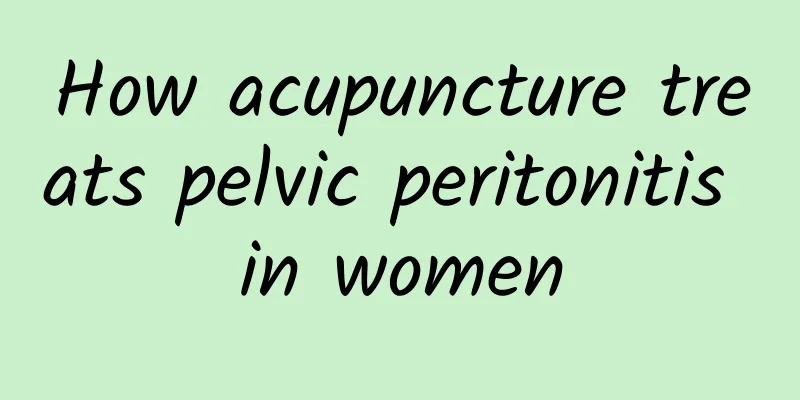Who is most likely to get pelvic peritonitis?

|
The two common types of pelvic peritonitis we see in daily life are acute pelvic peritonitis and chronic pelvic peritonitis. Chronic pelvic peritonitis is the most common. This may be because those who have not been cured of acute pelvic peritonitis or have poor physical constitution are most likely to suffer from it. There are also many small details in life that can cause you to suffer from this disease. So who is most likely to get pelvic peritonitis? Let's analyze it in detail below. 1. Postoperative infection in gynecological surgery: If the disinfection is not strict or there is chronic inflammation of the reproductive system during artificial abortion, IUD insertion or removal, fallopian tube intubation, salpingography, endometrial polyp removal, or submucosal uterine myomectomy, it is possible to cause postoperative infection. Some patients do not pay attention to personal hygiene after surgery, or do not follow the doctor's advice after surgery and resume sexual life too early, which can also cause bacterial infection and cause pelvic peritonitis. 2. Not paying attention to hygiene during menstruation: During menstruation, the endometrium is exfoliated, the blood sinuses in the uterine cavity are open, and there are blood clots, which are good conditions for bacteria to grow. If you do not pay attention to hygiene during menstruation, use sanitary napkins or toilet paper that do not meet the hygiene standards, or have sex, it will provide bacteria with opportunities for retrograde infection, leading to pelvic peritonitis. 3. Postpartum or post-abortion infection: The patient is weak after childbirth or miscarriage, and the cervical opening has not yet closed well after dilation. At this time, the bacteria in the vagina and cervix may ascend and infect the pelvic cavity. 4. Inflammation spreads to adjacent organs: The most common cases are appendicitis and peritonitis. Since they are adjacent to the female internal reproductive organs, inflammation can spread directly and cause inflammation of the female pelvic peritoneum. In chronic cervicitis, inflammation can also spread through lymphatic circulation and cause pelvic connective tissue inflammation. After we understand the causes of pelvic peritonitis, do you think that some of the causes are indeed closely related to our living habits? Men should also protect women well, not have sex during menstruation, and not let women do laundry and other work involving contact with cold water. Also, they should supplement nutrition and have a good rest. It is best not to take a bath, especially washing your hair, as this will have a great stimulation to our uterus and will cause gynecological diseases over time. I believe that through our introduction above, you have a certain understanding of the causes of pelvic peritonitis. Prevention and health care are the top priorities in our daily life. Don’t wait until you get sick to seek treatment. Caring for yourself is equal to caring for your family. |
<<: Is pelvic peritonitis serious in women?
>>: What is acute pelvic peritonitis?
Recommend
Explain the causes of pelvic inflammatory disease
Pelvic inflammatory disease is a genital infectio...
What is the difference between cysts and uterine fibroids? Are cysts and uterine fibroids the same?
What is the difference between cysts and uterine ...
How many days of rest is needed for medical abortion
Medical abortion is a non-surgical method of term...
Is it necessary to remove endometrial polyps during hysteroscopy?
Whether endometrial polyps need to be removed dur...
What to do with pelvic fluid accumulation after hysterectomy
What to do if there is pelvic fluid accumulation ...
What are the dangers of pelvic effusion and how to diagnose it
As a woman, you should have some basic knowledge ...
Experts talk about the treatment of acute pelvic inflammatory disease
Pelvic inflammatory disease is a common gynecolog...
What are the benefits of foot bathing for the uterus? Promote blood circulation
Persisting in foot soaking is very beneficial to ...
Fat kids, sitting for long periods of time is the culprit! 5 Tips for Controlling Diet
During the summer vacation, the number of obese c...
How long after the abortion can I have sex? Can I have sex with a condom 10 days after the operation?
Can you have sex with a condom 10 days after an a...
Some common symptoms of cervicitis
The harm of cervicitis to women is quite large. T...
What are the common symptoms of pelvic inflammatory disease?
Pelvic inflammatory disease is mainly divided int...
Can I take ibuprofen for dysmenorrhea? Don't take it too often
If the pain during dysmenorrhea is severe, women ...
Things female friends should pay attention to after suffering from adnexitis.
It seems to be a very common thing for women to s...
Ovarian cyst care requires increased protein intake
The care of ovarian cysts is very important for w...









